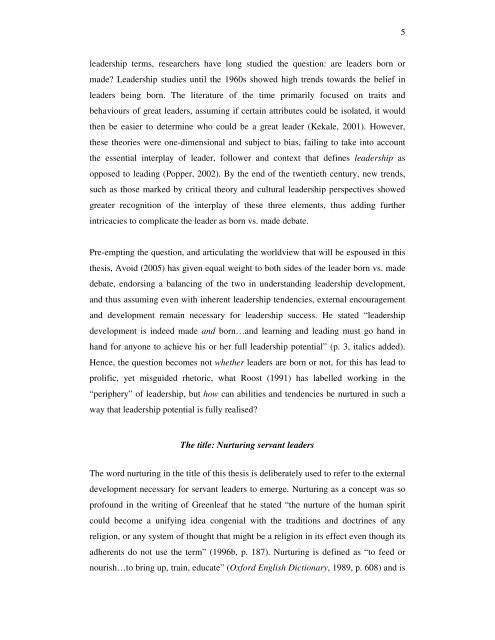nurturing servant leaders in religious education - Scholarly ...
nurturing servant leaders in religious education - Scholarly ...
nurturing servant leaders in religious education - Scholarly ...
You also want an ePaper? Increase the reach of your titles
YUMPU automatically turns print PDFs into web optimized ePapers that Google loves.
<strong>leaders</strong>hip terms, researchers have long studied the question: are <strong>leaders</strong> born or<br />
made? Leadership studies until the 1960s showed high trends towards the belief <strong>in</strong><br />
<strong>leaders</strong> be<strong>in</strong>g born. The literature of the time primarily focused on traits and<br />
behaviours of great <strong>leaders</strong>, assum<strong>in</strong>g if certa<strong>in</strong> attributes could be isolated, it would<br />
then be easier to determ<strong>in</strong>e who could be a great leader (Kekale, 2001). However,<br />
these theories were one-dimensional and subject to bias, fail<strong>in</strong>g to take <strong>in</strong>to account<br />
the essential <strong>in</strong>terplay of leader, follower and context that def<strong>in</strong>es <strong>leaders</strong>hip as<br />
opposed to lead<strong>in</strong>g (Popper, 2002). By the end of the twentieth century, new trends,<br />
such as those marked by critical theory and cultural <strong>leaders</strong>hip perspectives showed<br />
greater recognition of the <strong>in</strong>terplay of these three elements, thus add<strong>in</strong>g further<br />
<strong>in</strong>tricacies to complicate the leader as born vs. made debate.<br />
Pre-empt<strong>in</strong>g the question, and articulat<strong>in</strong>g the worldview that will be espoused <strong>in</strong> this<br />
thesis, Avoid (2005) has given equal weight to both sides of the leader born vs. made<br />
debate, endors<strong>in</strong>g a balanc<strong>in</strong>g of the two <strong>in</strong> understand<strong>in</strong>g <strong>leaders</strong>hip development,<br />
and thus assum<strong>in</strong>g even with <strong>in</strong>herent <strong>leaders</strong>hip tendencies, external encouragement<br />
and development rema<strong>in</strong> necessary for <strong>leaders</strong>hip success. He stated “<strong>leaders</strong>hip<br />
development is <strong>in</strong>deed made and born…and learn<strong>in</strong>g and lead<strong>in</strong>g must go hand <strong>in</strong><br />
hand for anyone to achieve his or her full <strong>leaders</strong>hip potential” (p. 3, italics added).<br />
Hence, the question becomes not whether <strong>leaders</strong> are born or not, for this has lead to<br />
prolific, yet misguided rhetoric, what Roost (1991) has labelled work<strong>in</strong>g <strong>in</strong> the<br />
“periphery” of <strong>leaders</strong>hip, but how can abilities and tendencies be nurtured <strong>in</strong> such a<br />
way that <strong>leaders</strong>hip potential is fully realised?<br />
The title: Nurtur<strong>in</strong>g <strong>servant</strong> <strong>leaders</strong><br />
The word <strong>nurtur<strong>in</strong>g</strong> <strong>in</strong> the title of this thesis is deliberately used to refer to the external<br />
development necessary for <strong>servant</strong> <strong>leaders</strong> to emerge. Nurtur<strong>in</strong>g as a concept was so<br />
profound <strong>in</strong> the writ<strong>in</strong>g of Greenleaf that he stated “the nurture of the human spirit<br />
could become a unify<strong>in</strong>g idea congenial with the traditions and doctr<strong>in</strong>es of any<br />
religion, or any system of thought that might be a religion <strong>in</strong> its effect even though its<br />
adherents do not use the term” (1996b, p. 187). Nurtur<strong>in</strong>g is def<strong>in</strong>ed as “to feed or<br />
nourish…to br<strong>in</strong>g up, tra<strong>in</strong>, educate” (Oxford English Dictionary, 1989, p. 608) and is<br />
5

















